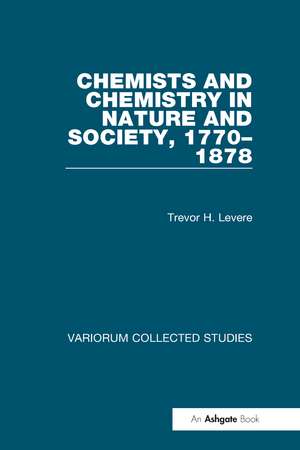Chemists and Chemistry in Nature and Society, 1770–1878: Variorum Collected Studies
Autor Trevor H. Levereen Limba Engleză Hardback – 14 apr 1994
Din seria Variorum Collected Studies
-
 Preț: 311.18 lei
Preț: 311.18 lei -
 Preț: 310.55 lei
Preț: 310.55 lei -
 Preț: 299.55 lei
Preț: 299.55 lei - 9%
 Preț: 1041.23 lei
Preț: 1041.23 lei -
 Preț: 386.77 lei
Preț: 386.77 lei -
 Preț: 351.48 lei
Preț: 351.48 lei -
 Preț: 313.38 lei
Preț: 313.38 lei -
 Preț: 386.77 lei
Preț: 386.77 lei -
 Preț: 310.22 lei
Preț: 310.22 lei -
 Preț: 258.66 lei
Preț: 258.66 lei -
 Preț: 343.33 lei
Preț: 343.33 lei - 9%
 Preț: 938.44 lei
Preț: 938.44 lei -
 Preț: 311.41 lei
Preț: 311.41 lei - 9%
 Preț: 938.85 lei
Preț: 938.85 lei -
 Preț: 312.75 lei
Preț: 312.75 lei - 9%
 Preț: 936.60 lei
Preț: 936.60 lei -
 Preț: 341.55 lei
Preț: 341.55 lei -
 Preț: 320.00 lei
Preț: 320.00 lei - 34%
 Preț: 764.20 lei
Preț: 764.20 lei - 22%
 Preț: 312.43 lei
Preț: 312.43 lei - 34%
 Preț: 739.65 lei
Preț: 739.65 lei - 34%
 Preț: 764.20 lei
Preț: 764.20 lei - 34%
 Preț: 680.73 lei
Preț: 680.73 lei - 26%
 Preț: 247.40 lei
Preț: 247.40 lei - 34%
 Preț: 485.78 lei
Preț: 485.78 lei - 34%
 Preț: 764.20 lei
Preț: 764.20 lei - 34%
 Preț: 769.51 lei
Preț: 769.51 lei - 34%
 Preț: 764.20 lei
Preț: 764.20 lei - 34%
 Preț: 826.68 lei
Preț: 826.68 lei - 25%
 Preț: 222.32 lei
Preț: 222.32 lei - 25%
 Preț: 225.54 lei
Preț: 225.54 lei - 34%
 Preț: 767.07 lei
Preț: 767.07 lei - 34%
 Preț: 764.20 lei
Preț: 764.20 lei - 34%
 Preț: 736.38 lei
Preț: 736.38 lei - 34%
 Preț: 738.42 lei
Preț: 738.42 lei - 25%
 Preț: 226.52 lei
Preț: 226.52 lei - 33%
 Preț: 491.66 lei
Preț: 491.66 lei - 34%
 Preț: 485.78 lei
Preț: 485.78 lei - 34%
 Preț: 485.78 lei
Preț: 485.78 lei - 34%
 Preț: 764.20 lei
Preț: 764.20 lei - 34%
 Preț: 736.38 lei
Preț: 736.38 lei - 31%
 Preț: 473.94 lei
Preț: 473.94 lei - 18%
 Preț: 807.71 lei
Preț: 807.71 lei - 34%
 Preț: 764.20 lei
Preț: 764.20 lei - 34%
 Preț: 764.20 lei
Preț: 764.20 lei - 34%
 Preț: 764.20 lei
Preț: 764.20 lei - 51%
 Preț: 485.78 lei
Preț: 485.78 lei - 34%
 Preț: 485.78 lei
Preț: 485.78 lei - 34%
 Preț: 769.10 lei
Preț: 769.10 lei - 34%
 Preț: 766.65 lei
Preț: 766.65 lei
Preț: 464.14 lei
Preț vechi: 672.21 lei
-31% Nou
Puncte Express: 696
Preț estimativ în valută:
88.83€ • 92.03$ • 74.13£
88.83€ • 92.03$ • 74.13£
Comandă specială
Livrare economică 28 februarie-14 martie
Doresc să fiu notificat când acest titlu va fi disponibil:
Se trimite...
Preluare comenzi: 021 569.72.76
Specificații
ISBN-13: 9780860784128
ISBN-10: 0860784126
Pagini: 320
Dimensiuni: 150 x 224 mm
Greutate: 0.54 kg
Ediția:1
Editura: Taylor & Francis
Colecția Routledge
Seria Variorum Collected Studies
Locul publicării:Oxford, United Kingdom
ISBN-10: 0860784126
Pagini: 320
Dimensiuni: 150 x 224 mm
Greutate: 0.54 kg
Ediția:1
Editura: Taylor & Francis
Colecția Routledge
Seria Variorum Collected Studies
Locul publicării:Oxford, United Kingdom
Cuprins
Contents: Preface; Martinus van Marum (1750-1837): the introduction of Lavoisier’s chemistry into the Low Countries; Friendship and influence: Martinus van Marum, F.R.S.; Relations and rivalry: interactions between Britain and The Netherlands in 18th-century science and technology; Balance and gasometer in Lavoisier’s chemical revolution; Dr Thomas Beddoes at Oxford: radical politics in 1788-1793 and the fate of the Regius chair in chemistry; Dr Thomas Beddoes (1750-1808): science and medicine in politics and society; Dr Thomas Beddoes and the establishment of his Pneumatic Institution: a tale of three presidents; Dr Thomas Beddoes: the interaction of pneumatic and preventive medicine with chemistry; The rich economy of nature: chemistry in the 19th century; Elements in the structure of Victorian science, or Cannon revisited; Humphry Davy and the idea of glory; S.T. Coleridge: a poet’s view of science; Coleridge, chemistry and the philosophy of nature; Hegel and the earth sciences; Faraday, electrochemistry, and natural philosophy; Faraday, matter, and natural theology: reflections on an unpublished manuscript; Affinity or structure: an early problem in organic chemistry; Gay-Lussac and the problem of chemical qualities; Arrangement and structure: a distinction and a difference; Index.
Descriere
In the 18th century chemistry established itself as both an autonomous and a public science, moving from mining and medicine into agriculture and geology, indeed into the entire material and cultural fabric of society. This chemical revolution had its epicentre in France, but quickly spread. The present volume looks at theoretical and practical aspects of that revolution in France and The Netherlands, then turns to Britain, where Thomas Beddoes mixed French chemistry, medicine, and democratic politics. With the 19th century, Humphrey Davy, emerging from Beddoes’s Pneumatic Institution (from which he rapidly distanced himself), took public chemistry dramatically to London. The following articles show how his friend Coleridge incorporated the science into a romantic philosophy of nature, and Faraday extended Davy’s work in electrochemistry, matter theory, and a theology of nature; even Hegel’s philosophy of geology based itself on chemistry. The final section explores debates about chemical affinity, qualities and arrangement.
